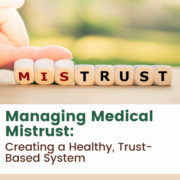Managing Medical Mistrust: Creating a Healthy, Trust-Based System
If there’s anything “positive” that has come out of the pandemic, it’s that it has brought to light the many disparities that are still prevalent in healthcare. These have translated into disparities in the Covid world based on where people live, their education level and income, and their race, among others.
The same can be said about oncology specifically. Health disparities in the diagnosis and management of cancer can be described as being “higher cancer death rates, less frequent use of proven screening tests, and higher rates of advanced cancer diagnoses.” This was (and still is in some areas) exacerbated by the pandemic, where patients either opted to delay treatment or were told they couldn’t undergo treatment because of the surge of Covid patients in clinics and hospitals. Additionally, there have been delays in patients undergoing screenings for cancers, including colon, cervical, and breast cancers, especially among those of racial and ethnic groups, who already had a decreasing level of access to healthcare services at the beginning of the pandemic.
Undoubtedly, this has increased the level of mistrust in the healthcare system. How are patients supposed to get the care they need? How do providers increase their level of trust with their patients who are already at a disadvantage and have a greater risk of becoming infected with Covid or any other disease? Below are ways the healthcare system can bring patients and providers together to create a healthy, trust-based system:
Providers should:
- Establish empathy and understanding of patients’ needs and values (and reiterate them back to the patient)
- Offer different treatment options, if available. Be willing to discuss the pros and cons of each option, including recommendations
- Discuss clinical trials as a treatment option, if applicable. Yes, healthcare is a business, but instead of a provider seeing it as “giving up” a patient, understanding that the patient’s health and well-being comes first is much more important
- Work with the patient’s insurance, if necessary, for prior-authorizations on medications and procedures
- Be honest with your patients. Gauge and/or ask about the amount of information they can handle when providing a diagnosis
- Tell a patient if they don’t know something and/or if errors have been made. Being vulnerable and transparent in this regard demonstrates that you’re human
Patients should:
- Be respectful of the physician’s (and other patients’) time during each appointment by bringing in a list of questions that need to be answered
- Utilize patient portals!
- Ask questions if unsure of anything spoken about during an appointment, especially medications
- Be your own advocate when discussing your health (i.e. bring up why certain solutions are important to you)
- Understand there are multiple patients being taken care of and no one patient’s needs are more or less important than another
Carly Flumer is a young woman who was diagnosed with stage I papillary thyroid cancer at the age of 27. She recently received her Master’s degree from Boston University in Health Communication and received her Bachelor’s from George Mason University in Health Administration and Policy. While being diagnosed with the “C” word at such a young age was a surprise, as it would be to anyone, she found strength, support, and inspiration in sharing her cancer journey on social media. As a result of her health outcome, she looks to advocate for other cancer patients through education, research, and health literacy.










